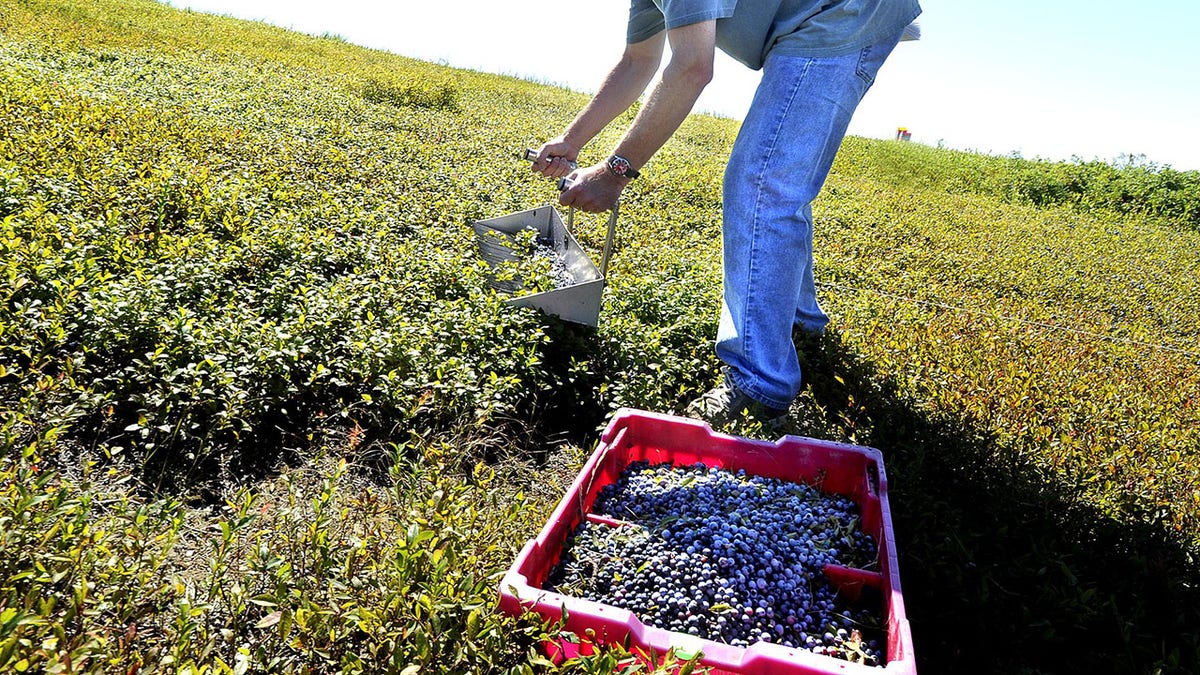Northeast
5 fruit-friendly facts for National Blueberry Pie Day: 'Healthy' and 'tasty'

Sunday, April 28, is “National Blueberry Pie Day” — helping to kick off pie-making season each year.
Though it’s unclear when this observation began, many find it a good excuse to enjoy a delicious slice of blueberry pie (ice cream on the side optional).
Want some “food for thought” during your celebrations?
THESE ARE THE 8 BEST FRUITS FOR YOUR HEALTH, ACCORDING TO NUTRITIONISTS
Here are five facts about this sweet treat for April 28th and well beyond.
1. Blueberry pie was invented in the 19th century
The first mention of a “blueberry pie” was in 1829, says the New England Historical Society, and it may have been included in an 1850 cookbook, though details are uncertain.
National Blueberry Pie Day is observed each year on April 28. (Denver Post/Cyrus McCrimmon)
The first recorded recipe for a “berry pie” was published in 1872’s “Appledore Cook Book,” says the website for “New England Recipes.”
BREAD KING OF PARIS RISES TO THE TOP IN ANNUAL BAGUETTE CONTEST: ‘A LOT OF LOVE’
The recipe called for “two spoonfuls of sugar,” and noted that the pie recipe would be suitable for any kind of berry, including blueberries.
2. Wild blueberries are native to North America
Wild blueberries are one of few commercial crops that are native to North America.
They’ve been grown for thousands of years, says the University of Maine’s website on wild Maine blueberries.

Blueberries are harvested with a tool known as a rake. (John Patriquin/Portland Press Herald via Getty Images)
The Wabanaki natives planted the first large-scale blueberry fields, said the University of Maine, and introduced the crop to English settlers during the 17th century.
3. Blueberry pie is Maine’s official ‘state dessert’
While 18 states have an official “State Dessert” or “State Pie,” only Maine has chosen to honor the blueberry pie.
SPINACH VS. KALE: WHICH IS ‘BETTER’ FOR YOU? NUTRITIONISTS SETTLE THE GREAT DEBATE
In 2011, state legislators voted to name “blueberry pie, made with wild Maine blueberries” as the “State Dessert,” following a surprisingly intense legislative battle with proponents of another Maine specialty, the whoopie pie.
(In a compromise, the whoopie pie was named the “State Treat.”)

“Blueberry pie, made with wild Maine blueberries,” was named Maine’s “State Dessert” in 2011 after a legislative battle. (Gabe Souza/Portland Press Herald via Getty Images)
Each year, Maine honors blueberry farmers during “Wild Blueberry Weekend,” typically in August during the harvesting season.
APPLES VS. ORANGES: WHICH OF THESE FRUITS IS ‘BETTER’ FOR YOU?
“Last year alone, Maine farmers harvested 77.5 million pounds of wild blueberries,” said Maine Gov. Janet Mills (D) in a 2023 press release.
“And we know that these wild blueberries are healthy, they have more antioxidants than cultivated blueberries, and they are tastier than any other kind of blueberry in the world.”
4. The Civil War helped spread the popularity of blueberries
During the Civil War, many Union Army soldiers were fed blueberries for the very first time.
Until that point, blueberries were largely only eaten by people in New England, where the plants were grown.

Until the Civil War, blueberries were not widely consumed outside of New England. (Scott Suchman/for The Washington Post)
Wild blueberries were shipped down from Maine to the Union soldiers, who developed quite a liking for them and brought them back to ther home states.
After the war, wild blueberry canning businesses developed, making it easier for the newly minted blueberry fans to get the fruit, said the New England Historical Society.
5. Blueberries might help your memory
“With 33% more deep purply blue anthocyanins and 2x the antioxidants of ordinary blueberries, wild blueberries contribute to healthy brains,” said the website for the Wild Blueberry Association of North America (WBANA).
Numerous studies have found that the regular consumption of blueberries can help improve cognitive decline in elderly adults, said the WBANA — and evidence has shown that the anthocyanins found in blueberries can slow brain aging.
Other studies have shown “significant positive effects on memory, decision-making, response times, concentration and mood” in children after they consume blueberries, said WBANA.
For more Lifestyle articles, visit www.foxnews.com/lifestyle.
Read the full article from Here

Connecticut
Connecticut Sues Internet Provider Over Hidden Fees, Deceptive Advertising

HARTFORD – Attorney General William Tong claims that Optimum Online, an internet service provider, has collected tens of millions of dollars in illegal fees from Connecticut consumers.
Now the state is suing Altice, Optimum’s parent company, to ban the fees and return the money to customers.
The state is accusing Altice, a European telecom conglomerate that acquired the former Cablevision services in 2016, of violating the Connecticut Unfair Trade Practices Act by unlawfully charging a “network enhancement fee.”
The complaint further alleges that Altice buries disclosures about advertised speed limits by listing them on the back of mailers in tiny print, in gray-on-gray backgrounds and in small “floating” words in their TV ads. The company is also accused of putting English-language disclaimers on Spanish marketing materials.
The complaint seeks both restitution for consumers and penalties.
The Office of the Attorney General first launched its investigation into Altice in November 2022, following more than 500 consumer complaints alleging hidden fees, poor technical support, and slow internet speeds.
According to Tong, Altice began unlawfully charging its customers a monthly fee of $2.50 in January 2019, which has increased over time to the current charge of $6 per month.
In total, Tong claims Altice has collected millions of dollars from Connecticut consumers through the “junk fee,” over and above the regular monthly internet service charge. He also alleges that the fee was not disclosed up front and appeared only in the shopping cart after a consumer selects an internet service.
“When customers pay for Internet service, they have a right to expect promised speeds and network reliability without being nickel and dimed with junk fees,” said Tong.
“It’s not a small amount, by the way, and it’s important to note that this is really hitting people and families every single day. This network enhancement fee is not a tax. It’s not a federally or state mandated fee. It’s just an extra charge that Altice is slipping in on the bill to take money from all of us.”
Altice defended the fee as necessary to “maintain and improve the network” and in a written statement, the company said the state’s lawsuit is “without merit.”
“Altice USA shares the state’s goal of ensuring Connecticut residents and businesses receive high-quality connectivity services and superior customer support. The company has invested hundreds of millions of dollars into its network, products, and support experiences across the state of Connecticut, which includes the deployment of our 100% Fiber Internet network to over two-thirds of our footprint in the state, delivering symmetrical speeds of up to 8 gig, the fastest residential internet service in our Connecticut service area. Altice USA provides customers with various offers at different speeds and price points, delivering reliable speeds and service with transparent pricing to customers throughout the state,” said Communications Director Erin Smyth.
Senate Majority Leader Bob Duff, D-Norwalk, described the “junk fees” as a deceptive scheme and of significant concern for residents in areas like Fairfield County and Litchfield County where options for internet service are limited.
“Frankly, Altice, which is a French company, uses Fairfield County and Litchfield County and all their customers as an ATM machine to send money back to their foreign company. We’re getting nothing in return for all these fees that we pay,” Duff said.
Maine
'Day Without Child Care' highlights systemic issues in affordable care

The sun was shining Monday afternoon as kids at YWCA Central Maine’s childcare programs made their way outside, enjoying face-painting and crafts set up for a “Day Without Child Care.” A nationwide effort, the day aims to emphasize the systemic issues in the child care industry, and the need for federal support.
Carrie Jadud is a community organizer with the Maine People’s Alliance.
“Child care should be basic infrastructure —you are able to get to work because we have roads and bridges, so you don’t really think about it, you just go on them, right? And we can do the same thing with child care, that is just a basic economic infrastructure,” she said.
Jadud said child care should be funded like other infrastructure- instead of placing the cost entirely on parents, which leaves families struggling to afford care and providers struggling to afford wages for staff.
The goal of Monday’s event was to show parents who are struggling to find and afford care that they are not alone, Jadud said. It’s not a personal failing, but a nationwide issue.
She said child care is a public issue, and should be treated as such.
“It’s something affects all of us, even if people don’t have young children themselves at this moment,” Jadud said. “This affects our whole economy when people can’t participate or can’t participate in the ways that they really are called to do.”
She said that while expansions to childcare worker stipends and family child care scholarships are a step in the right direction, the industry needs ongoing federal support.
Amanda Hatch, chief program and impact officer at the YWCA, said their child care programs are all full, with waitlists. And they often hear from families struggling to find an affordable option, especially as more providers have closed since the pandemic.
But Hatch said even though the YWCA is a larger, more established child care program, funding is always a concern. And supporting infrastructure for the industry would make that a lot easier.
“Just so that we weren’t always searching for the next dollar, or worried about how that was gonna impact the families who are already paying a lot for care and really would struggle to pay more for care,” Hatch said.
Massachusetts
2,000 migrant students added to 74 Massachusetts school districts this academic year

PEABODY – The migrant crisis in Massachusetts has added about 2,000 students to schools in 74 different districts this academic year, according to the state.
That means there are about 242 districts still not facing the issue of having a sudden, unexpected influx of migrant children in their systems.
“A small handful of communities can’t take on this burden and do it well,” Peabody Superintendent Josh Vadala told WBZ-TV. His district is one of the 74. They’ve added 80 students to Peabody schools since September.
“We’ve been talking to the state. You know, enough is enough,” Vadala said. “We’ve taken on our share and we are doing a good job. If you continue to pile on, we’re worried that we’re not going to be able to provide the same service and then it all falls apart.”
Massachusetts response to migrant student crisis
“We believe deeply that every single student, regardless of circumstance, should have a high-quality education. Every student deserves that,” Massachusetts Education Secretary Patrick Tutwiler told WBZ.
Tutwiler said the state is giving those 74 communities what they need, including $105 per student, per day.
“Language barrier is definitely a challenge. The Department of Elementary and Secondary Education (DESE) very quickly stood up translation supports. Mental health is also a significant challenge where we’re seeing really clear manifestations of the hardships that families experience coming here (and) situations where students are not familiar with the typical school routines and that takes a lot of patience,” Tutwiler said.
What’s worked so far?
The state has a task force to find solutions and determine what works, Tutwiler said.
“There are so many heartening stories around how districts have really met the moment and really transitioned and welcomed families in robust ways,” he told WBZ.
Tutwiler specifically mentioned Peabody and what Vadala has done there. He has used the whole community to help the whole family, from field trips to experiences outside the classroom.
Getting to know the families outside the school walls is paying off inside the classroom, according to Vadala.
“I’ve not seen models as robust as what we are doing. It’s not a competition but we are doing our level best to meet the needs of families here,” Tutwiler told WBZ. He said they key to all of this is more money from the federal government.
-
News1 week ago
A group of Republicans has united to defend the legitimacy of US elections and those who run them
-

 Politics1 week ago
Politics1 week agoHouse Dems seeking re-election seemingly reverse course, call on Biden to 'bring order to the southern border'
-

 Movie Reviews1 week ago
Movie Reviews1 week agoExhuma Movie Review: An effective horror film steeped in myth, legends, and realism
-

 World1 week ago
World1 week ago‘It’s going to be worse’: Brazil braces for more pain amid record flooding
-

 Politics1 week ago
Politics1 week ago'Stop the invasion': Migrant flights in battleground state ignite bipartisan backlash from lawmakers
-

 World1 week ago
World1 week agoGerman socialist candidate attacked before EU elections
-

 World1 week ago
World1 week agoSpain and Argentina trade jibes in row before visit by President Milei
-

 Politics1 week ago
Politics1 week agoRepublicans believe college campus chaos works in their favor














